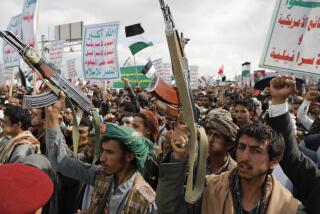Yemen’s coming disaster
- Share via
The Nigerian Islamist who allegedly attempted to detonate a bomb on a Christmas Day flight to Detroit, Umar Farouk Abdulmutallab, has brought Yemen once again into the spotlight as a breeding ground for terrorists. Abdulmutallab is thought to have trained with Yemen’s Al Qaeda affiliate, and the group has claimed credit for the failed attack.
Yemen has long been a place of concern. Last month, before the attempted airliner bombing, the United States facilitated a missile attack against two suspected Al Qaeda strongholds in Yemen. And over the weekend, the U.S. Embassy in Yemen’s capital city of Sana was closed because of security concerns.
But terrorism is just one of the threats the deteriorating situation in Yemen poses to U.S. interests.
Over the last few years, Yemen has been hurtling toward a disaster that could dramatically harm the interests of both the United States and its regional partners. An active insurgency in the north, a separatist movement in the south and a resurgent Al Qaeda franchise inside its borders present the Yemeni government with difficult short-term challenges. And managing the country’s longer-term problems is likely to prove even tougher.
Yemen’s economy depends heavily on oil production, and its government receives the vast majority of its revenue from oil taxes. Yet analysts predict that the country’s petroleum output, which has declined over the last seven years, will fall to zero by 2017. The government has done little to plan for its post-oil future. Yemen’s population, already the poorest on the Arabian peninsula and with an unemployment rate of 35%, is expected to double by 2035. An incredible 45% of Yemen’s population is under the age of 15. These trends will exacerbate large and growing environmental problems, including the exhaustion of Yemen’s groundwater resources. Given that a full 90% of the country’s water is used for agriculture, this trend portends disaster.
This confluence of political, ideological, economic and environmental forces will render Yemen a fertile ground for the training and recruitment of Islamist militant groups for the foreseeable future. More than 100 Yemenis have been incarcerated in Guantanamo since 2002. And today, Internet message boards linked to Al Qaeda encourage fighters from across the Islamic world to flock to Yemen. The country is home to Al Qaeda in the Arabian Peninsula, which has carried out attacks in Yemen and Saudi Arabia.
Yemen’s role as a haven for transnational terror groups with global reach could easily continue to grow. President Obama has stated his intention to work with the governments of Afghanistan and Pakistan to eliminate havens in those countries for terror groups such as Al Qaeda. This could make Yemen an even more attractive place for would-be terrorists. Recent Saudi offensives against insurgents in northern Yemen, together with a Saudi naval blockade of the Yemeni coast, demonstrate how seriously other countries on the Arabian peninsula take the threat that instability in Yemen could radiate outward.
U.S. policy should aim to bring Yemen back from the brink, mitigating the risk to the rest of the peninsula by increasing the country’s domestic stability. This task will not be achieved easily, quickly or inexpensively, and the use of force alone won’t be sufficient. Any effective strategy must combine security assistance with mediation efforts, development, regional engagement and an effective communications approach.
Since 2001, U.S. policy has focused mostly on counter-terrorism. Given the threat posed not just by terrorism but by the potential for nationwide instability, the United States should move toward a broader relationship with Yemen, still focusing strongly on counter-terrorism but also on economic development and improved governance. The U.S. approach should publicly stress the comprehensive relationship that America seeks with Yemen. In so doing, the U.S. can build on the ad hoc, uncoordinated efforts of numerous international players in Yemen -- from Europe, the Persian Gulf states, Jordan and Japan, among others. This could start with a new international donor’s conference, including a “contract with Yemen” that would provide aid in response to steps taken by the government to address issues of corruption, governance and human rights.
No amount of foreign assistance will cure Yemen’s deeply entrenched economic, social and political problems. Yet in light of our compelling national interest in avoiding a failed state in Yemen, the United States has reason to devote even greater resources to the effort than it does today.
Over the weekend, Obama pledged to double aid to Yemen, but this money must be spent strategically. Several areas are ripe for foreign help, including training and equipping counter-terrorism forces, bolstering border security and building the capacity of the coast guard, expanding counterinsurgency advice to the Yemeni government and expanding programs focused on basic governance and anti-corruption.
A key challenge will be encouraging Yemen’s government to confront Al Qaeda, something it has not been sufficiently willing to do up to now. The government’s repeated battles against Houthi insurgents in the north have claimed resources that might otherwise have been directed at Al Qaeda elements. It is thus worth exploring whether mediation aimed at a political settlement of that conflict is achievable. In addition, the U.S. should privately make clear that the degree of political support it extends to the government of Yemen will depend directly on its taking action on the array of issues that concern Washington.
The goal of U.S. foreign policy toward Yemen should be for the country to emerge as a stable, functioning state, one that presents no sanctuary for transnational terrorist groups. U.S. policy alone can’t bring this about. It can, however, attempt to mitigate the worst of the coming challenges that will plague Yemen.
Richard Fontaine is a senior fellow at the Center for a New American Security and traveled to Yemen with a Senate delegation in August. Andrew Exum is a fellow at the center.
More to Read
Sign up for Essential California
The most important California stories and recommendations in your inbox every morning.
You may occasionally receive promotional content from the Los Angeles Times.










